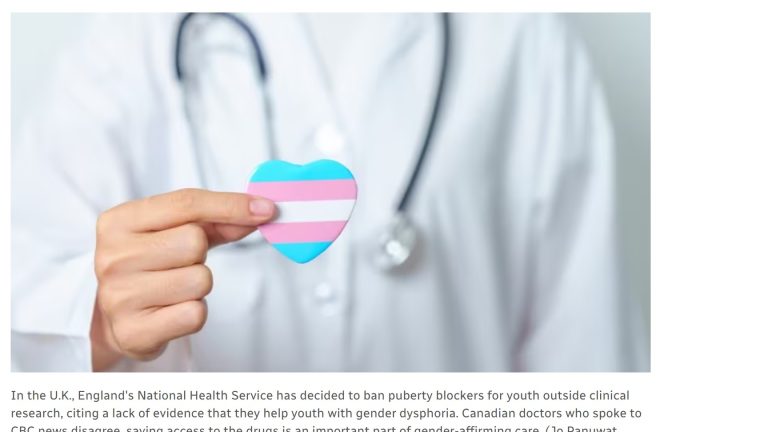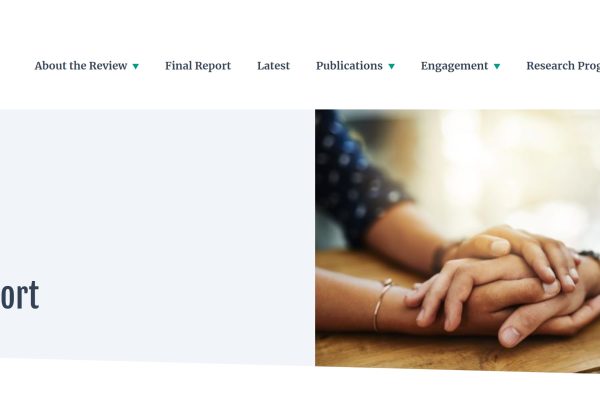The Cass Review is an extremely credible and extensive look into the UK’s gender services for children and young people. Canada and the UK both began to adopt the “gender affirming” model of care in the past decade. The Cass Review exposed an incredible lack of evidence supporting the gender affirming model of care and has now recommended that puberty blockers should only be given to a subset of young people who meet strict criteria that suggest a consistent and persistent gender that is different from their birth sex and only under a research program that can be monitored.
The UK’s approach to treating gender-distressed young people has reverted to a paradigm that is more consistent with “watchful waiting”. It promises to treat individuals holistically and not “exceptionalize” young people because of their expressed gender, and will continue to shine a light on gender-related treatments provided to young people so that outcomes can be monitored and a new level of knowledge and certainty developed with respect to how gender questioning youth should be supported through their distress during puberty.
The Cass Review has made reverberations around the world with both the Netherlands and Belgium now calling on a full review of their gender services for young people. In the US, both the NY Times and the Boston Globe have reported that this kind of review is necessary and welcome. Multiple left leaning outlets in the US have run opinion columns like “Europe is making progress on Gender Medicine. The US should catch up.” and “The US needs a bipartisan, open-minded gender medicine commission”
In the UK, even Pink News ran a very factual article stating that the Cass Review found “extreme caution” must be exercised when prescribing puberty blockers. Pink News stated that WPATH had been discredited by the Review as lacking “developmental rigour”. Pink also quoted a spokesperson from Stonewall who did not dispute the Review’s findings, but instead, only expressed concern about how quickly the regional centres could be staffed.
Only a few short years ago, Pink News could be relied upon to slam any attempt to restrict gender-affirming treatments for young people. How things have changed. Except in Canada.
Here, only the National Post has taken a serious look into the Review to report on the findings and implications of the final report. Coverage from the National Post has been balanced and factual.
This opinion article by the National Post’s Tristin Hopper points out that Canada’s officialdom doesn’t care that there’s a medical scandal unfolding under their watch.
The Globe & Mail has been eerily silent. No articles or even opinion pieces on the Cass Review Final Report. What on earth is going on over there?
The Globe & Mail decided the new UK anti-smoking law should be covered here in Canada this week, and by their European correspondent, but have yet to release anything about the Cass Report.
The CBC finally reported on the landmark final report of the Cass Review almost a week after it was released in the UK. Tellingly, the CBC timidly approached the topic by telling Canadians what captured Canadian doctors think about the Cass Review. “What Canadian doctors say about new U.K. review questioning puberty blockers for transgender youth”
It’s not clear that the people interviewed by CBC have even read the Cass Report. The conclusion the journalist draws is, of course, that Canadian doctors disagree with restricting access to puberty blockers.
“In the U.K., England’s National Health Service has decided to ban puberty blockers for youth outside clinical research, citing a lack of evidence that they help youth with gender dysphoria. Canadian doctors who spoke to CBC news disagree, saying access to the drugs is an important part of gender-affirming care.”
CBC News article spin on the Cass Report
The article suggests the move of the UK is “away from the standard of care supported by many international medical bodies, including the Canadian Pediatric Society (CPS), the American Academy of Pediatrics and World Professional Association for Transgender Health.”
This statement, in particular, reveals the lack of knowledge on the subject and misinformation being spread to the public. The CPS does not have a “standard of care” related to gender affirming treatments for young people, and the CBC links to a CPS position paper that specifically states it is not intended as a clinical guideline.
Further, the Cass Report systematically reviewed various guidelines, including the AAP and WPATH’s so-called “standard of care” and found that these did not meet the expected standard for evidence-based care.
The CBC article offers a few factual comments, such as that Sweden has also restricted access to puberty blockers and that the report cites a systematic review of evidence that found a lack of evidence that puberty blockers can help young people with gender dysphoria.
The physicians interviewed, by contrast, offer laughable quotes to anyone who follows the debate about gender affirmation treatments outside of Canada’s border: one Calgary physician declares that the Review reached it’s conclusions because “randomized clinical trials” weren’t available, and said that we don’t deny pregnant women care for them because there aren’t randomized clinical trials for the condition of pregnancy.
Another suggests that many “off-label” medications are given to children and youth for many reasons, and that there often is no “good quality evidence” supporting the use of medications in children.
The example given is to treat an ear infection. This is extremely disingenuous given that puberty blockers are being used to effect completely different outcomes from their intended use. Further, the potential for harm by using antibiotics to treat an ear infection (same condition but different dosage from an adult) compared with the potential for lifelong health impacts, loss of sexual function, loss of healthy body parts and loss of fertility are in a completely different risk category.
Where the risk of harm is high, so too must be the evidence-base, or putting the treatments under clinical trial protocols so that treatment outcomes can be studied, harms identified and managed and the evidence-base improved. There is no admission by Canada’s head of our Pediatric Society in this article that the UK is taking the most prudent path, given the level of risk and the current level of evidence. Did the CBC reporter even ask that question? What is the most prudent course of action given the lack of evidence and the risk of harm?
The Alberta Medical Association is quoted as saying puberty blockers are “safe” because we have data for their use treating precocious puberty. This is a completely different indication than for blocking normally timed puberty, and the resulting transition to cross-sex hormones which have many more irreversible effects.
The CBC article also gives time to those who suggest the Review is coming from a “place of bias”, yet the CBC continues to ignore it’s own bias in reporting on this topic in Canada.
Donaldson, a family physician in Calgary who prescribes puberty blockers to some of his patients, gets the last word in this article and insists that Canadian institutions and physicians are “following the guidelines to the best available evidence”.
“We have institutions that are set in place that are evidence based that are providing this care for individuals in a way that is following the guidelines to the best available evidence.”
Dr Donaldson, Calgary based physician
In light of the extensive evidence reviews undertaken by Cass, this can only mean our institutions in Canada are in fact, not evidence-based and that they do not follow the “best available evidence”. This lack of insight from a physician treating gender questioning youth does not instill confidence.
The reality is, Canadian institutions are applying a social justice lens to gender affirming care, not one based in “the best available evidence”.
Thousands of Canadian young people are now routinely being prescribed puberty blockers and other medical interventions for “gender” without any oversight to ensure these interventions are safe.
The CBC continues to parrot the convenient voices of trans-activism while shirking their responsibility to apply investigative rigour to this topic.
The role of journalism in a free and democratic society is to provide checks and balances that ultimately protect the public from harm and abuses of power. CBC has once again demonstrated that they eschew this responsibility. They continue to take the word of our institutional leaders at face value and trust that the people in white coats can, in fact, be trusted.
The CBC can do better than this off-handed and off-the-cuff article on the Cass Review. The Globe & Mail has sidelined the topic entirely except when promoting these treatments without question. The political will of certain governments seems the only option left for Canada to step back from the brink of this medical scandal and ensure appropriate guidelines, based on an actual evidence-base, are developed and followed.




Both Dr Cass and the BMJ are extremely well thought of. To have them seemingly dismissed by CBC is, quite frankly, bizarre.
The couple of Doctors CBC produced for comment about the report didn’t make any sense at all.
I’ve witnessed CBCs bias in the past – Tony Blair’s Labour party were embarrassed 20 years ago when a statistician blew the whistle on the crime rate figures they produced that had been sourced from her department. They had been blatently massaged and were far lower than the real figures.
Red faces all round.
Regardless, in an interview with CBCs correspondent in London, he simply dismissed the whistleblowers allegations as lies.
So that’s alright then.
Balanced journalism..? Oh how we laughed.